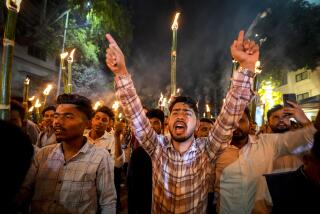Pakistan restricts screening of films from India
ISLAMABAD, Pakistan — Perennial tensions between Pakistan and India found their way into movie theaters Tuesday when a Pakistani judge imposed restrictions on the screening of Indian films.
Responding to a petition filed by controversial television talk show host Mubashir Luqman, the Lahore high court issued an interim order barring the screening of any imported film unless it can be established that it has proper documents and the sponsorship of a Pakistani national, both required by law. Luqman, once a film producer, is known for his anti-India views.
Luqman claimed that many movies shot in India must be barred from the country because they use “fake documents” and mask the identity of their Indian sponsors.
PHOTOS: Behind the scenes of movies and TV
High court judge Khalid Mahmood in the interim decision also ordered Pakistan’s Film Censor Board and Board of Revenue to give their view on the petition by Monday.
Although Pakistan’s film production industry is experiencing a modest renewal, it’s dwarfed by Indian films, which are hugely popular and have helped bring Pakistani viewers back into theaters since ex-military ruler Pervez Musharraf eased import restrictions in 2006. Pakistan produces around two dozen films annually, a sharp drop from the estimated 200 it released each year in the 1970s and a fraction of the 1,000 India produces.
Some Pakistani movie viewers bridled at the prospect of a ban.
“Things are so tense, with so much death and destruction in Pakistan, and these films are one of the few things that provide some relief,” said Sajjad Khan, 30, a government worker from Rawalpindi. “They can put a ban but can’t stop me from watching Indian film. They should try making films to Indian standards if they want us to stop watching their films.”
ON LOCATION: Where the cameras roll
Pakistan banned Indian films in 1962, with restrictions tightened further in 1965 after the two countries fought a war and in 1979 when then-President Muhammad Zia ul-Haq launched an Islamization agenda and an even stricter censorship code. This only fueled the trade in pirated Bollywood films on videotape and DVD, which remained widely available across the country.
Arts critics said they see little popular backlash against Indian films and television shows, even if some individuals have tried to block them. The government will also have trouble fighting against “fake documentation” since it has accepted the documents, some said.
“The burden of proof will shift to the government to prove they’re fake,” said Hasan Zaidi, a Lahore-based director and film critic. “The order won’t be implemented.”
Indian critics said the decision appeared to be less about protecting Pakistani filmmakers than a feared cultural onslaught.
“The reach of Indian cinema is massive, not just in Pakistan but also East Asia,” said Mayank Shekhar, a Bollywood film critic in the Indian city of Mumbai. “Imposing a restriction only means that piracy in Pakistan will increase, which is already flourishing. The Pakistan entertainment industry will lose with regressive decisions like this.”
PHOTOS: Celebrities by The Times
Those who fear an onslaught are imagining things, added Tahir Sarwar Mir, a Lahore-based film and culture critic.
“How come it would be a cultural invasion?” he said. “We share thousands of years of culture with India. My wife’s favorite star is [Bollywood superstar] Shah Rukh Khan. She doesn’t even know the names of Pakistani film stars.”
Zaidi said the fledgling Pakistani cinema industry, which saw theaters decline to around 100 nationwide recently from 1,200 a few decades ago, has finally started building a few multiplex theaters.
“After Indian films came in the past couple of years, the number of cinemas have actually started going up,” he said. “Cinema houses are making money, so they’ll be upset with any move to ban Indian films.”
Tuesday’s court order came days after Pakistan’s broadcast regulator slapped fines worth a total of $90,000 on 10 entertainment channels for airing “excessive Indian and foreign content,” including serials and films. Private TV channels in Pakistan are allowed to broadcast only a maximum of 6% Indian content and 4% other foreign content for a total of 10% non-Pakistani programming.
The regulator said it received about 5,000 complaints in October from viewers, including some concerned over “vulgarity” in Bollywood films and “ribaldry” in songs, adding that on some channels 80% of the content was of Indian origin.
Special correspondent Sahi reported from Islamabad and Times staff writer Magnier from New Delhi. Tanvi Sharma in the Times’ New Delhi bureau contributed to this report.
More to Read
Only good movies
Get the Indie Focus newsletter, Mark Olsen's weekly guide to the world of cinema.
You may occasionally receive promotional content from the Los Angeles Times.






